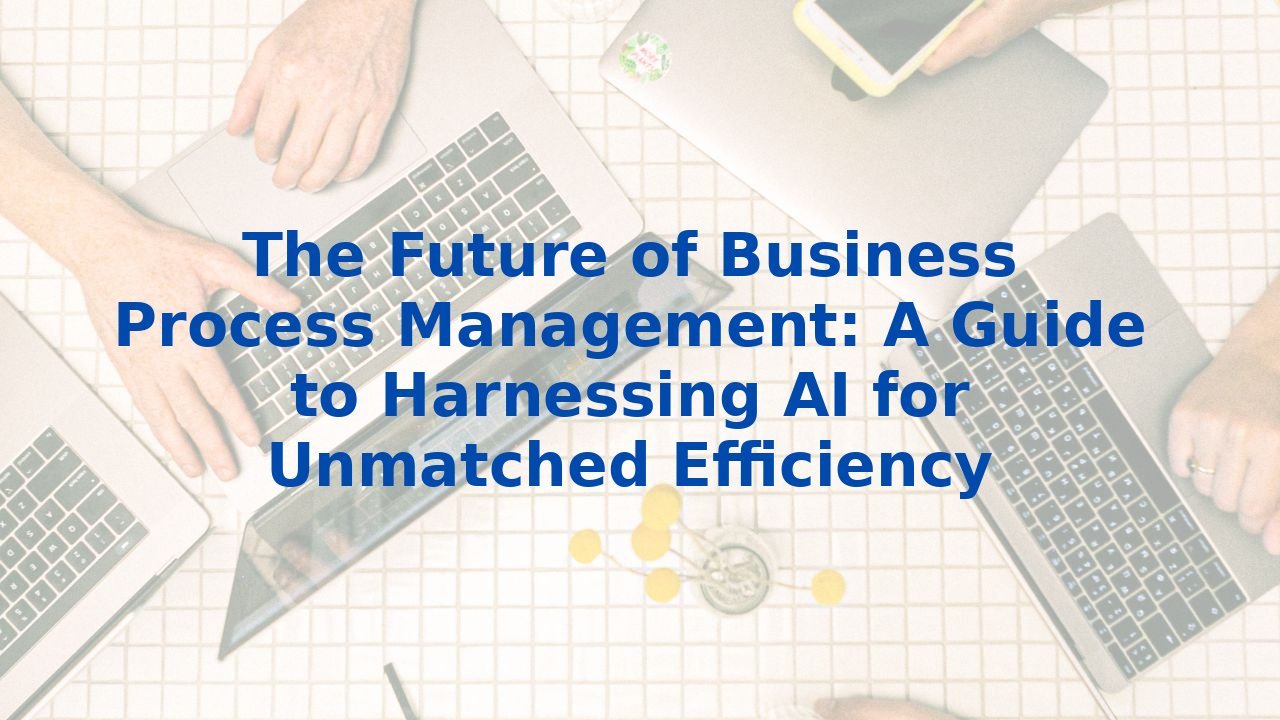The Future of Business Process Management: A Guide to Harnessing AI for Unmatched Efficiency
The Future of Business Process Management: A Guide to Harnessing AI for Unmatched Efficiency
In an era defined by rapid advancements and fierce competition, businesses are continuously searching for ways to optimize their operations and enhance overall efficiency. Enter Artificial Intelligence (AI)—a transformative force in Business Process Management (BPM) that's reshaping how organizations approach their workflows. This guide explores the various ways AI enhances crucial business processes, highlighting the significant benefits it offers in improving organizational efficiency.
Process Discovery: Unearthing Hidden Opportunities
At the heart of successful BPM lies the process discovery phase, where organizations map out their existing operations. Traditional methods often involve tedious employee interviews or manual data analysis, which are both time-consuming and prone to inaccuracies. AI revolutionizes this phase by employing process mining and pattern recognition to explore vast amounts of operational data swiftly.
Imagine an intelligent assistant that sift through thousands of records, identifying patterns, workflows, and intricacies that might otherwise remain hidden. With AI's precision, businesses can pinpoint inefficiencies and engage with insights that can drive immediate improvements, saving time and enhancing decision-making capabilities.
Process Mapping: Crafting Actionable Blueprints
The insights gathered during process discovery need to be actionable. AI excels in this area by transforming analytical insights into structured blueprints of operational workflows. By leveraging machine learning and data analytics, AI creates comprehensive visual representations of processes, illustrating how each component interacts and identifying bottlenecks.
This responsiveness ensures that process documentation evolves in tandem with real-world business dynamics. Constantly refreshed, these documentation maps empower organizations to remain agile, making adjustments in real time as needed.
Process Automation: The Engine of Effortless Efficiency
One of the most pronounced applications of AI within BPM is in process automation. Robotic Process Automation (RPA) driven by AI can assume repetitive, mundane tasks—freeing up human talent for higher-value activities. Whether it’s data entry, invoice processing, or responding to customer queries, AI can perform these tasks with speed and unwavering accuracy.
This operational overhaul is not just about executing tasks more efficiently; it's about enhancing the entire ethos of how work is done. Employees can redirect their focus towards strategic initiatives that foster creativity, innovation, and growth, thereby enriching the organizational culture.
Process Management: Navigating Performance with Precision
Once processes are automated, managing these operations becomes an exercise of vigilance. AI-enhanced tools provide real-time monitoring of key performance indicators (KPIs), alerting stakeholders to any deviations from expected outcomes. This immediate feedback loop facilitates swift interventions, preventing small hiccups from ballooning into larger issues.
Moreover, AI’s predictive analytics capabilities allow organizations to foresee potential disruptions based on historical data, promoting a culture of proactive management. By anticipating challenges, businesses can make informed decisions that preserve workflow integrity and operational performance.
Process Improvement: Continuous Evolution
The journey does not end with efficient management; continuous improvement is paramount. AI’s analytical prowess enables ongoing validation and refinement of business processes. By furnishing organizations with data-driven recommendations and actionable insights, AI plays a pivotal role in fostering a culture of innovation.
With AI, the path to sustained improvement is one of iterative enhancement, enabling organizations to stay aligned with changing market demands and best practices. This adaptable framework ensures that BPM strategies evolve coherently with the organizational growth trajectory.
The Imperative of Employee Training
While the integration of AI into BPM is a game-changer, organizations must also prioritize training their workforce to effectively collaborate with these intelligent systems. Understanding how AI tools function and their role in day-to-day operations is crucial for employee adaptation and efficacy.
Training empowers employees to embrace new processes and workflows, fostering a collaborative relationship between human intuition and machine learning. This synergy not only mitigates fears of job displacement but enhances employee engagement as they upskill and take on new responsibilities in this evolving landscape.
Conclusion
The intersection of AI and Business Process Management heralds a new era of operational excellence. With AI enhancing processes from discovery to continuous improvement, organizations can achieve remarkable efficiencies that differentiate them in competitive markets. But remember, while the tools and technologies are vital, the human element—through training and adaptation—remains equally essential in this transformation. By integrating AI intelligently and equipping their workforce with the necessary skills, companies can embrace the future with confidence, agility, and unstoppable momentum.
To learn more about how to equip your organization with the AI skills necessary for thriving in this environment, visit Complete AI Training.



